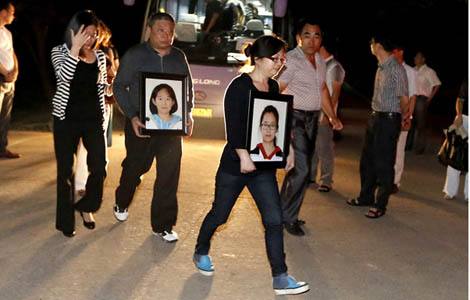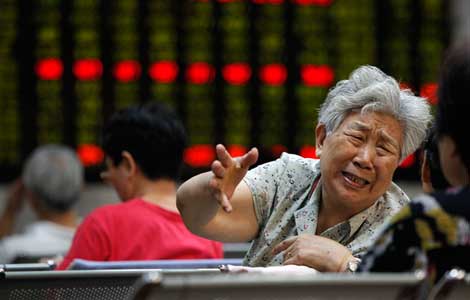China, US will discuss human rights
Updated: 2013-07-30 11:29
By Chen Weihua in Washington (China Daily)
|
||||||||
After a string of high-level meetings over the past two months, officials from the world's two largest economies will sit down on Tuesday to discuss one of the most sensitive and contentious subjects between them - human rights.
The time and place of 18th China-US Human Rights Dialogue - July 30-31 in Kunming, the capital of Southwest China's Yunnan province - was agreed upon by the two sides at the 5th Strategic and Economic Dialogue in Washington earlier this month.
China's delegation will be led by Li Junhua, director-general of the Foreign Ministry's Department of International Organizations and Conferences and a former ambassador to Myanmar. Heading up the US delegation will be Uzra Zeya, acting assistant secretary for democracy, human rights and labor at the US State Department.
The agenda covers a wide range of issues, from the latest progress in each country's human rights protections and national security, cooperation in international human rights, human rights and laws, freedom of expression and the protection of privacy, according to the Chinese Foreign Ministry statement.
A statement by Jen Psaki, spokeswoman of the US State Department, emphasized the topics of freedom of religion, freedom of expression, labor rights and the rights of ethnic minorities.
"The two sides are expected to have candid and in-depth exchanges on the basis of equality and mutual respect in order to promote human rights development in both countries," the Chinese statement said.
While in China, the US delegation is also scheduled to visit Beijing for talks with officials and civil society representatives.
"The promotion of human rights remains a key tenet of US foreign policy, including toward China, and we are committed to continuing candid and in-depth discussion with the Chinese government on this issue," Psaki said in the statement.
The two countries started their human rights dialogue in 1990, but talks were suspended from 2002 to 2008 after the US decided to introduce a human rights motion related to China at a session of the United Nations Commission on Human Rights. China claimed such an action by the US destroyed the foundation for dialogue.
The issue of human rights was also mentioned at the S&ED in Washington earlier this month. In his concluding remarks, US Deputy Secretary of State William Burns said the US had expressed its concerns about human rights in China, mentioning incidents in the Tibet and Xinjiang Uygur autonomous regions.
Chinese State Councilor Yang Jiechi retorted that people in various regions in China - including Xinjiang and Tibet - were "enjoying unprecedented freedoms and human rights".
"We hope the US side will view China's economic and social development in an objective way, and we hope the US will improve its own human rights situation on the basis of mutual respect and non-intervention in each other's internal affairs," said Yang, who had previously served as China's foreign minister and ambassador to the US.
Many Chinese were angered at the double standard displayed by the US when it failed to condemn the violent killings of innocent people by terrorists, separatists and extremists in Xinjiang in June.
Chinese officials have long stressed the right to survival and development as a fundamental human right in a country with a population of more than 1.3 billion.
A Chinese government white paper on human rights issued in May listed progress in various sectors, but also acknowledged the arduous task that lay ahead in achieving a higher level of protection of human rights in China.
While every year the US State Department issues human rights reports on some 190 countries and regions in the world, including China but excluding itself, China's State Council issues an annual report on the US' human rights record based on information gathered from mainstream Western media.
This year's report, released in late April, listed facts and figures for the US government's massive covert surveillance of its own people, even before the revelations by National Security Agency contractor Edward Snowden were leaked two weeks later.
The Chinese report also listed problems of growing gun violence, money in politics (especially last year's presidential election), worsening poverty and a widening income gap, and racial discrimination, as well as human rights violations in countries such as Afghanistan, Pakistan, and Yemen, where US actions had caused civilian death.
These accusations coincided with widespread protests in the past years in the US against US drone attacks in foreign countries and the Guantanamo detention center where prisoners on hunger strike were force fed.
Besides the US, China also maintains human rights dialogues with some 20 countries and organizations, including Canada, Switzerland, Germany, Norway and the European Union.
A month ago, the 32nd round of the China-EU Dialogue on Human Rights was held in Guiyang, capital of southwest China's Guizhou province, after which both sides said "frank and in-depth talks enhanced mutual understanding".
chenweihua@chinadailyusa.com
(China Daily USA 07/30/2013 page1)
- China, EU hold human rights dialogue in SW China
- Cooperation and dialogue needed to enhance human rights
- Pride and prejudice in dialogue over human rights
- Full text: Progress in China's Human Rights in 2012
- US 'turns a blind eye to human rights'
- Human rights record of the United States in 2012
- Human Rights Watch reveals its bias
Most Viewed
Editor's Picks

|

|

|

|

|

|
Today's Top News
Families of crash victims to sue Asiana in the US
China, US will discuss human rights
Former US president plans to visit DPRK
China struggles to retain talents
Apple in labor rights inquiry
SOEs overseas profits to soar
Detroit: Gold mine for China
Major SOEs eye profits from abroad
US Weekly

|

|















